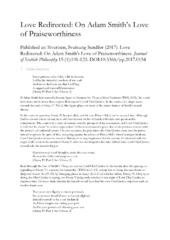| dc.contributor.author | Sivertsen, Sveinung Sundfør | |
| dc.date.accessioned | 2017-03-21T09:30:33Z | |
| dc.date.available | 2017-03-21T09:30:33Z | |
| dc.date.issued | 2017 | |
| dc.identifier.issn | 1479-6651 | |
| dc.identifier.uri | https://hdl.handle.net/1956/15603 | |
| dc.description.abstract | Why be moral? Why, in the language of Adam Smith, act on what you think is praiseworthy even when it does not get you praise from other people? Because, answers Smith, you love praiseworthiness. But what is this love of praiseworthiness, and where does it come from? In this article, 1) I argue that we start to love praiseworthiness when we redirect our love of praise away from other people toward the ‘impartial spectator’-aspect of ourselves, and 2) show how this fits with evidence that the rudimentary moral compass which guides us early in childhood needs correction through socialisation to develop into a mature moral conscience. | en_US |
| dc.language.iso | eng | eng |
| dc.publisher | Edinburgh University Press | eng |
| dc.subject | Adam Smith | eng |
| dc.subject | love of praise | eng |
| dc.subject | love of praiseworthiness | eng |
| dc.subject | moral development | eng |
| dc.subject | Impartial spectator | eng |
| dc.subject | moral compass | eng |
| dc.subject | infant morality | eng |
| dc.title | Love Redirected: On Adam Smith's Love of Praiseworthiness | eng |
| dc.type | Peer reviewed | |
| dc.type | Journal article | |
| dc.description.version | acceptedVersion | |
| dc.rights.holder | Copyright Edinburgh University Press | eng |
| dc.identifier.doi | https://doi.org/10.3366/jsp.2017.0154 | |
| dc.identifier.cristin | 1420336 | |
| dc.source.journal | Journal of Scottish Philosophy | |
| dc.source.40 | 15 | |
| dc.source.14 | 1 | |
| dc.source.pagenumber | 101-123 | |
